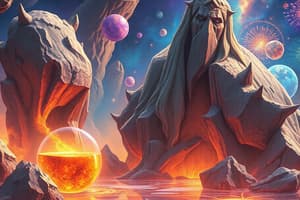Podcast
Questions and Answers
What is matter?
What is matter?
Anything that has mass and occupies space.
What distinguishes a physical property from a chemical property?
What distinguishes a physical property from a chemical property?
Physical properties can be observed without changing the composition of the substance, while chemical properties involve a substance's ability to react with others.
Which of the following are states of matter?
Which of the following are states of matter?
- Liquid (correct)
- Plasma (correct)
- Gas (correct)
- Solid (correct)
Plasma is considered a distinct state of matter.
Plasma is considered a distinct state of matter.
What is a Bose-Einstein condensate?
What is a Bose-Einstein condensate?
Match the following properties with their definitions:
Match the following properties with their definitions:
Flashcards are hidden until you start studying
Study Notes
Introduction to Chemistry
- Inorganic Chemistry encompasses various fundamental concepts, starting with an understanding of matter and its properties.
Lesson 1: Matter and Its Properties
- Matter is defined as anything that has mass and occupies space.
- All items on Earth possess mass and take up space, making them matter.
Particulate Nature of Matter
- Matter is composed of particles which include:
- Atoms: the smallest unit of matter that cannot be broken down.
- Molecules: groups of two or more atoms that are chemically bonded.
- Ions: particles that have gained or lost valence electrons, resulting in a charge.
States of Matter
- The primary states of matter include:
- Solid
- Liquid
- Gas
- Plasma is identified as the fourth state of matter, consisting of ionized gas with equal numbers of positive ions and negative electrons.
- Bose-Einstein Condensate is the fifth state of matter achieved at temperatures near absolute zero, where atoms clump together in the same energy state due to minimal movement.
Classification of Properties of Matter
- Properties of matter are categorized based on measurement changes and dependence on quantity:
- Physical Properties: Observable without changing the substance's composition.
- Examples: Color, Melting Point, Density, Solubility, Conductivity, Malleability, Luster, Viscosity, Boiling Point.
- Chemical Properties: The ability of a substance to react with other substances, such as air, water, and acids.
- Extensive Properties: Depend on the amount of matter present.
- Examples: Mass, Volume, Length.
- Intensive Properties: Independent of the amount of sample present and remain consistent regardless of size.
- Physical Properties: Observable without changing the substance's composition.
Objectives of the Lesson
- Ability to describe and classify different forms of matter.
- Differentiation between pure substances and mixtures, elements and compounds, homogeneous and heterogeneous mixtures.
- Recognition of common substance formulas.
- Discussion of methods for separating mixture components.
- Identification of chemical substances in consumer products.
Summary of Key Concepts
- Understanding the particulate nature is crucial for classification of matter.
- Different states of matter exhibit unique properties and characteristics.
- The properties of matter can be categorized into physical and chemical, as well as intensive and extensive, affecting their measurements and reactions.
Studying That Suits You
Use AI to generate personalized quizzes and flashcards to suit your learning preferences.




